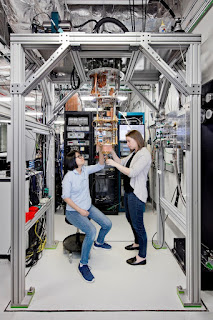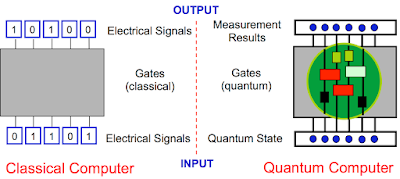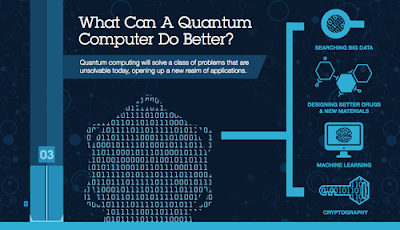Twitter Feed
Strategies And Technologies for Cloud Computing Interoperability (SATCCI)
As I alluded to in an earlier post, a major cloud computing interoperability event will be held in conjunction with the Object Management Group (OMG) March Technical Meeting on March…
Government Cloud Computing E-zine Launched
Today marks the launch of a new electronic magazine dedicated to addressing cloud computing within the government space. Over the last year during my personal exploration of this marketspace, I’ve…
NCOIC Plenary: Cloud Computing Working Group
Last week, I had the pleasure of participating in the NCOIC Cloud Computing Working Group. Led by Cisco Systems Distinguished Engineer, Mr. Krishna Sankar of Cisco Systems, the meeting purpose…
2nd Government Cloud Computing Survey – A Sneak Peek
This month, we’re in the middle of collecting data for our 2nd Government Cloud Computing Survey. to peek your curiosity (an to entice your participation) here is a sneak peek…
Government could save billions with cloud computing
In a recent study, published by MeriTalk, Red Hat and DLT Solutions, the Federal government could save $6.6 billion by using cloud computing or software-as-a-service. “Looking at 30 federal agencies,…
Cloud Games at FOSE 2009
ONLINE REGISTRATION NOW AVAILABLE Booz Allen Hamilton is launching its Cloud Computing Wargame (CCW)T at FOSE March 10-12, 2009 in Washington, DC. The CCW is designed to simulate the major…
IBM and Amazon
According to the Amazon Web Services (AWS) site, you can now use DB2, Informix, WebSphere sMash, WebSphere Portal Server or Lotus Web Content Management on Amazon’s EC2 cloud. “This relationship…
A Berkeley View of Cloud Computing
Yesterday, Berkeley released their View of Cloud Computing with a view that cloud computing provides an elasticity of resources, without paying a premium for large scale, that is unprecedented in…
Cloud Economic Models
One of the most important drivers of cloud computing in the Federal space is its perceived “compelling” economic value. Some initial insight on the economic argument is now available on…
Cloud Computing In Government: From Google Apps To Nuclear Warfare
Today, I want to thank John Foley of InformationWeek for an enjoyable interview and his excellent post, Cloud Computing In Government: From Google Apps To Nuclear Warfare. Our discussion covered…
- The release of a new API (Application Program Interface) for the IBM Quantum Experience that enables developers and programmers to begin building interfaces between its existing five quantum bit (qubit) cloud-based quantum computer and classical computers, without needing a deep background in quantum physics.
- The release of an upgraded simulator on the IBM Quantum Experience that can model circuits with up to 20 qubits. In the first half of 2017, IBM plans to release a full SDK (Software Development Kit) on the IBM Quantum Experience for users to build simple quantum applications and software programs.
The IBM Quantum Experience enables anyone to connect to IBM’s quantum processor via the IBM Cloud, to run algorithms and experiments, work with the individual quantum bits, and explore tutorials and simulations around what might be possible with quantum computing. Since its launch less than a year ago, about 40,000 users have run over 275,000 experiments on the IBM Quantum Experience. It has become an enablement tool for scientists in over 100 countries and, to date, 15 third-party research papers have been posted to arXiv with five published in leading journals based on experiments run on the Quantum Experience.
 The broad availability of quantum computing capability could prove to be a significant blow to current data encryption practices. In 2015 the US National Security Agency actually advised US agencies and businesses to prepare for a time when the cryptography protecting virtually all e-mail, medical and financial records, and online transactions would be rendered obsolete by quantum computing. The US National Institute for Standards and Technology (NIST) is also running a competition to spur work on post-quantum algorithms.
The broad availability of quantum computing capability could prove to be a significant blow to current data encryption practices. In 2015 the US National Security Agency actually advised US agencies and businesses to prepare for a time when the cryptography protecting virtually all e-mail, medical and financial records, and online transactions would be rendered obsolete by quantum computing. The US National Institute for Standards and Technology (NIST) is also running a competition to spur work on post-quantum algorithms. - Drug and Materials Discovery: Untangling the complexity of molecular and chemical interactions leading to the discovery of new medicines and materials;
- Supply Chain & Logistics: Finding the optimal path across global systems of systems for ultra-efficient logistics and supply chains, such as optimizing fleet operations for deliveries during the holiday season;
- Financial Services: Finding new ways to model financial data and isolating key global risk factors to make better investments;
- Artificial Intelligence: Making facets of artificial intelligence such as machine learning much more powerful when data sets can be too big such as searching images or video; or
- Cloud Security: Making cloud computing more secure by using the laws of quantum physics to enhance private data safety.
This content is being syndicated through multiple channels. The opinions expressed are solely those of the author and do not represent the views of GovCloud Network, GovCloud Network Partners or any other corporation or organization.
( Thank you. If you enjoyed this article, get free updates by email or RSS – © Copyright Kevin L. Jackson 2017)
Cloud Computing
- CPUcoin Expands CPU/GPU Power Sharing with Cudo Ventures Enterprise Network Partnership
- CPUcoin Expands CPU/GPU Power Sharing with Cudo Ventures Enterprise Network Partnership
- Route1 Announces Q2 2019 Financial Results
- CPUcoin Expands CPU/GPU Power Sharing with Cudo Ventures Enterprise Network Partnership
- ChannelAdvisor to Present at the D.A. Davidson 18th Annual Technology Conference
Cybersecurity
- Route1 Announces Q2 2019 Financial Results
- FIRST US BANCSHARES, INC. DECLARES CASH DIVIDEND
- Business Continuity Management Planning Solution Market is Expected to Grow ~ US$ 1.6 Bn by the end of 2029 - PMR
- Atos delivers Quantum-Learning-as-a-Service to Xofia to enable artificial intelligence solutions
- New Ares IoT Botnet discovered on Android OS based Set-Top Boxes




